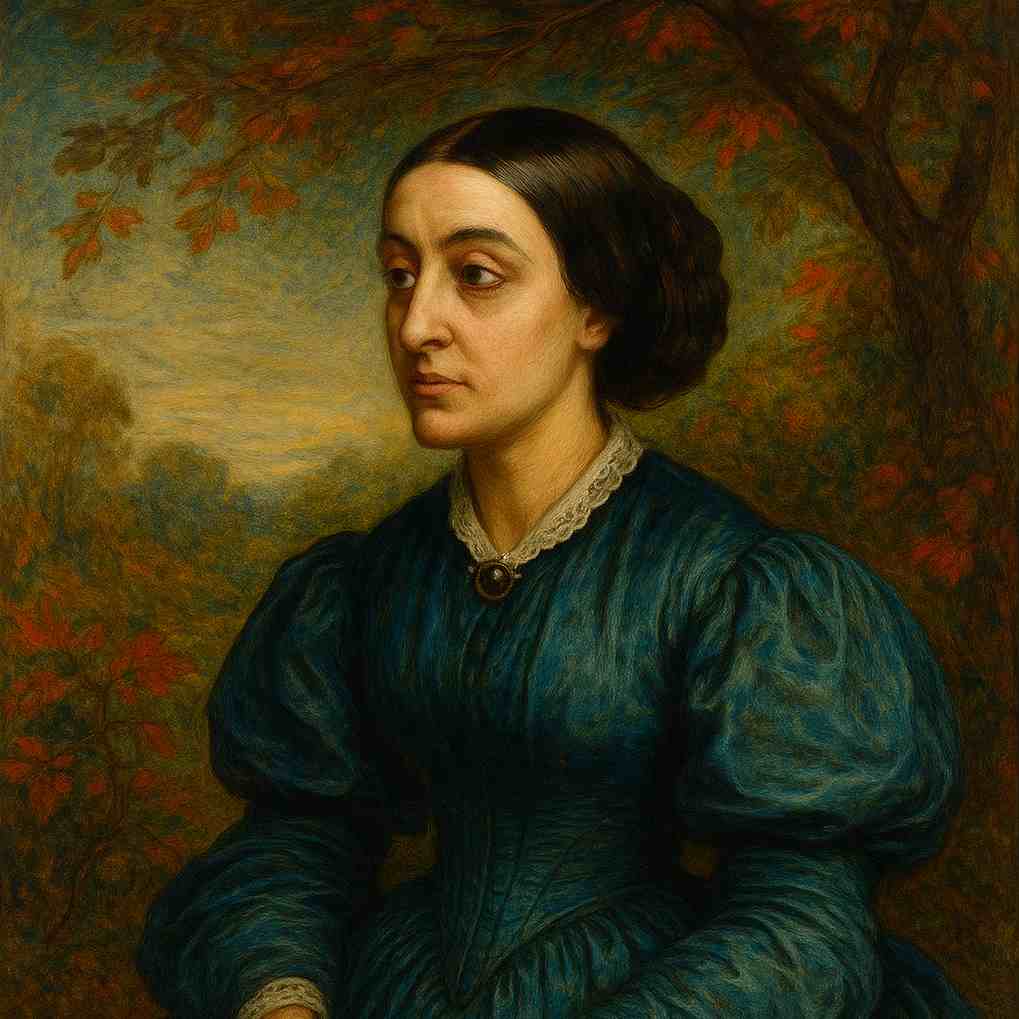Let Me Go
Christina Rossetti
1830 to 1894

When I come to the end of the road
And the sun has set for me
I want no rites in a gloom filled room
Why cry for a soul set free?
Miss me a little, but not for long
And not with your head bowed low
Remember the love that once we shared
Miss me, but let me go.
For this is a journey we all must take
And each must go alone.
It’s all part of the master plan
A step on the road to home.
When you are lonely and sick at heart
Go to the friends we know.
Laugh at all the things we used to do
Miss me, but let me go.
Christina Rossetti's Let Me Go
Introduction
Christina Rossetti's poem "Let Me Go" is a poignant exploration of death, grief, and the human experience of loss. This work, characterized by its simple yet profound language, invites readers to contemplate the nature of mortality and the complex emotions that surround it. Through a careful analysis of its structure, imagery, and thematic content, we can uncover the layers of meaning embedded within Rossetti's verses and appreciate the enduring relevance of her message.
Structure and Form
The poem consists of four quatrains, each following an ABCB rhyme scheme. This structure, reminiscent of ballad form, lends the poem a musical quality that enhances its emotional impact. The regularity of the meter, predominantly iambic tetrameter, creates a rhythmic flow that mirrors the steady progression of life towards its inevitable conclusion.
Rossetti's choice of this form is significant. The ballad, traditionally associated with storytelling and oral tradition, allows the poet to convey her message in a manner that feels both intimate and universal. The simplicity of the structure belies the complexity of the themes addressed, creating a tension that runs throughout the work.
Imagery and Symbolism
The poem opens with a powerful metaphor: "When I come to the end of the road / And the sun has set for me." This imagery immediately establishes the central theme of death, presenting it not as a terrifying abyss but as a natural conclusion to life's journey. The setting sun, a common symbol for death in literature, is employed here to great effect, evoking a sense of peaceful transition rather than abrupt termination.
Rossetti continues to employ evocative imagery throughout the poem. The "gloom filled room" in the third line stands in stark contrast to the freedom of the "soul set free" in the fourth. This juxtaposition underscores the poem's central argument: that death should be viewed not as an end to be mourned but as a liberation to be celebrated.
The recurring phrase "Miss me, but let me go" serves as both a refrain and a central symbol of the poem. It encapsulates the complex emotions surrounding death – the natural desire to hold on to loved ones and the equally important need to release them. This phrase, in its simplicity and directness, becomes the emotional core of the work.
Thematic Analysis
At its heart, "Let Me Go" is a meditation on the nature of death and the process of grieving. Rossetti challenges conventional attitudes towards mortality, advocating for a more accepting and even optimistic view of life's end. The speaker of the poem, addressing loved ones from beyond the grave, urges them to temper their grief with celebration of the life lived and the love shared.
The poem's second stanza introduces the idea of measured mourning: "Miss me a little, but not for long / And not with your head bowed low." This sentiment reflects a nuanced understanding of grief, acknowledging its necessity while cautioning against prolonged or debilitating sorrow. Rossetti suggests that excessive mourning does a disservice not only to the living but also to the memory of the deceased.
In the third stanza, Rossetti broadens her perspective, presenting death as a universal experience: "For this is a journey we all must take / And each must go alone." This universality serves to demystify death, presenting it not as a tragedy but as an integral part of the human experience. The reference to a "master plan" introduces a spiritual dimension to the poem, suggesting a larger purpose or design behind the cycle of life and death.
The final stanza returns to the personal, offering practical advice for coping with loss: "When you are lonely and sick at heart / Go to the friends we know." Here, Rossetti emphasizes the importance of community and shared memories in the healing process. The exhortation to "Laugh at all the things we used to do" presents remembrance not as a somber duty but as a source of joy and comfort.
Language and Tone
The language of "Let Me Go" is characterized by its simplicity and directness. Rossetti eschews complex vocabulary and ornate phrasing in favor of clear, accessible language. This choice serves multiple purposes. Firstly, it ensures that the poem's message is comprehensible to a wide audience, reflecting the universality of its themes. Secondly, it lends the poem an air of sincerity and authenticity, as if these are the genuine words of a departed loved one.
The tone of the poem is gentle yet firm. While the speaker acknowledges the pain of loss, there is an underlying insistence on acceptance and forward movement. This is particularly evident in the recurring phrase "Miss me, but let me go," which combines empathy with a clear directive. The overall effect is one of comforting authority, as if the deceased is offering guidance from beyond.
Cultural and Historical Context
To fully appreciate "Let Me Go," it is essential to consider its cultural and historical context. Christina Rossetti, writing in Victorian England, was part of a society grappling with changing attitudes towards death and mourning. The Victorian era was known for its elaborate mourning rituals and prolonged periods of grief, particularly as exemplified by Queen Victoria's decades-long mourning for Prince Albert.
In this context, Rossetti's poem can be read as a gentle rebellion against prevailing norms. By advocating for a more measured approach to grief and a more positive view of death, she challenges the excessive and often performative mourning practices of her time. The poem's emphasis on remembrance and celebration over sorrow aligns with a more modern approach to death and loss.
Moreover, as a deeply religious woman, Rossetti's work often reflected her spiritual beliefs. The reference to a "master plan" and the description of death as a "step on the road to home" reflect a Christian understanding of death as a transition to an afterlife. However, the poem's message transcends any specific religious doctrine, offering comfort and wisdom to readers of diverse beliefs.
Literary Influences and Comparisons
While "Let Me Go" is distinctly Rossetti's work, it bears comparison to other poems dealing with themes of death and remembrance. One might draw parallels with Emily Dickinson's "Because I could not stop for Death," which similarly presents death as a journey rather than an end. However, where Dickinson's poem maintains an air of mystery and ambiguity, Rossetti's work is characterized by its clarity and directness.
The poem's structure and themes also evoke the tradition of the medieval memento mori, artistic or literary reminders of mortality. However, Rossetti subverts this tradition by presenting death not as a fearful inevitability but as a natural and even welcome transition.
Conclusion
"Let Me Go" stands as a testament to Christina Rossetti's skill as a poet and her insight into the human condition. Through its carefully constructed verses, the poem offers a profound meditation on death, grief, and the enduring power of love and memory. Rossetti's ability to distill complex emotions and philosophical concepts into accessible, deeply moving poetry is on full display here.
The poem's enduring popularity speaks to its universal relevance. In a world where death remains one of the few true constants, Rossetti's words continue to offer comfort and perspective to those grappling with loss. By encouraging readers to embrace a more balanced approach to grief – one that honors the pain of loss while celebrating the joy of remembrance – "Let Me Go" provides a valuable framework for processing one of life's most challenging experiences.
Ultimately, Rossetti's poem is a celebration of life as much as it is an acceptance of death. It reminds us that the connections we forge in life continue beyond the grave through memory and love. In its gentle wisdom and compassionate guidance, "Let Me Go" offers not just solace in the face of loss, but a roadmap for living life fully, with an awareness of its transience and an appreciation for its beauty.
This text was generated by AI and is for reference only. Learn more
Want to join the discussion? Reopen or create a unique username to comment. No personal details required!



Comments
No comments yet. Be the first to comment!